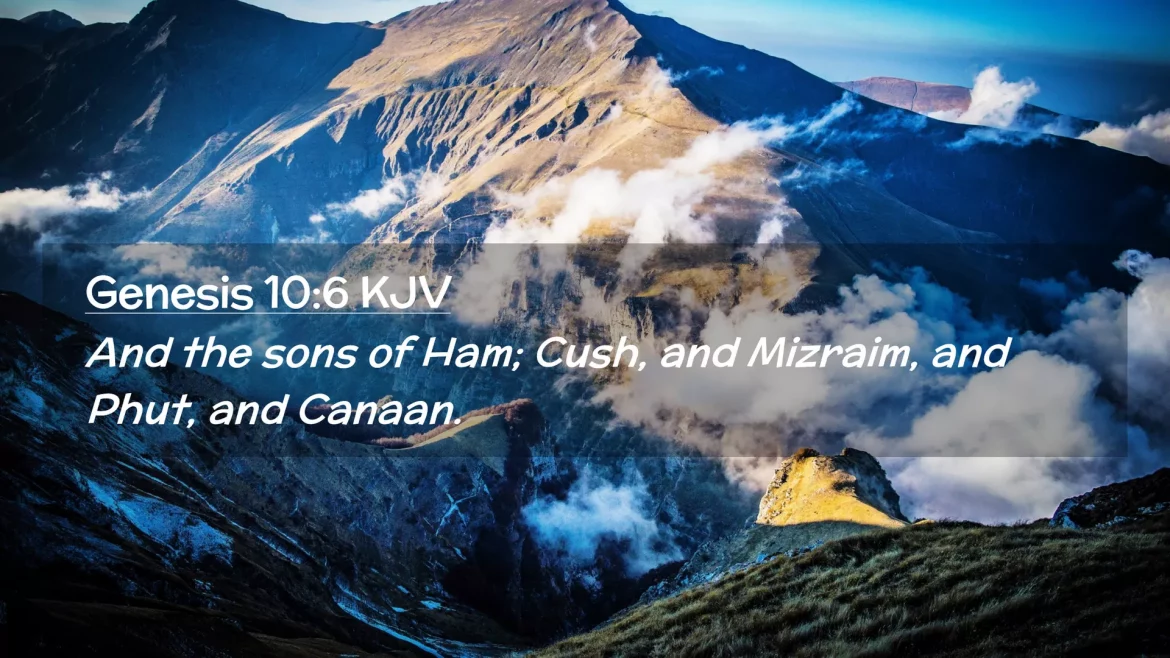Read the Daily Bible Verse Genesis 10:6 To Strengthen Your Spiritual Journey.
Genesis 10:6 KJV
“And the sons of Ham; Cush, and Mizraim, and Phut, and Canaan.”
Background of Genesis 10:6
Genesis 10:6 is part of the Table of Nations, a genealogical record that outlines the descendants of Noah‘s three sons—Shem, Ham, and Japheth—after the Great Flood. This verse specifically focuses on the lineage of Ham, who was the second son of Noah. The sons of Ham listed in this verse are Cush, Mizraim, Phut, and Canaan. These names represent significant ancestral figures whose descendants became prominent nations in the ancient world. The chapter is foundational for understanding the distribution of nations and peoples, especially in the ancient Near East.
Meaning of Genesis 10:6
Genesis 10:6 highlights the descendants of Ham, who became the progenitors of several nations. Each of these sons represents a distinct group of people:
Cush is traditionally associated with the region of Ethiopia or Nubia, which lies south of Egypt.
Mizraim is the Hebrew name for Egypt.
Phut is believed to represent the region of Libya or other areas in North Africa.
Canaan is perhaps the most well-known of Ham’s sons, as his descendants inhabited the land of Canaan, which later became central to the biblical narrative, especially regarding the Israelites.
The mention of these descendants serves to establish the origins of various nations that would play significant roles in the biblical story and history.
Application of Genesis 10:6 in Life
The genealogical record in Genesis 10:6 can be applied to life by emphasizing the importance of heritage, lineage, and the impact of ancestry on identity. Just as these ancient nations traced their roots back to Ham, understanding our own spiritual heritage can deepen our sense of identity and purpose. For Christians, this could involve recognizing the importance of being part of God‘s family through faith in Jesus Christ. Additionally, this verse reminds us of the interconnectedness of humanity, as all nations ultimately trace their origins back to Noah’s family, emphasizing unity and the value of every nation and culture.
Comparison with Other Biblical Texts
Genesis 10:6 can be compared with other genealogies and accounts in the Bible, such as:
1 Chronicles 1:8-16: This passage repeats the genealogical information found in Genesis 10, reaffirming the significance of these nations in the biblical narrative.
Deuteronomy 7:1-2: In this passage, the Israelites are commanded to conquer the land of Canaan, the territory inhabited by the descendants of Canaan, Ham’s son. This shows the fulfillment of the territorial division hinted at in Genesis 10:6.
Isaiah 18: Isaiah’s prophecy concerning Cush shows the biblical attention given to the descendants of Ham throughout the scriptures, demonstrating their ongoing relevance in God’s redemptive plan.
These comparisons reveal how the nations descending from Ham interacted with the people of Israel and were involved in God’s broader plan for humanity.
See also: What Does Genesis 10:5 Mean?
Modern Relevance
The modern relevance of Genesis 10:6 lies in its reflection of the diversity and unity of humanity. In a world that is increasingly connected, understanding the biblical perspective on the origins of nations can promote a sense of shared human history. The verse reminds us that, despite our differences, all people are part of God’s creation. This encourages Christians to approach issues of race, nationality, and ethnicity with a biblical mindset, promoting love, respect, and unity among all people.
Furthermore, the verse serves as a reminder of the consequences of sin and the importance of redemption. The nations descending from Ham, particularly Canaan, played roles in the unfolding story of Israel, often in opposition to God’s people, illustrating the ongoing need for reconciliation and restoration in Christ.
Conclusion
Genesis 10:6, though a simple genealogical record, carries profound implications for understanding the origins of nations and their roles in the biblical narrative. It serves as a reminder of humanity’s shared ancestry, the importance of heritage, and the unity that can be found in Christ. By reflecting on this verse, Christians are encouraged to recognize the diversity within God’s creation and to work towards unity and reconciliation in today’s world.
Comments on Genesis 10:6
Historical Significance: “Genesis 10:6 gives us a glimpse into the origins of some of the most ancient and influential nations in human history. Understanding these roots helps us appreciate the depth of the biblical narrative.”
Spiritual Reflection: “This verse challenges us to consider our spiritual heritage and the legacy we leave for future generations. It’s a call to live in a way that honors our place in God’s family.”
Unity in Diversity: “In a time when division seems prevalent, Genesis 10:6 reminds us that all nations stem from a common ancestor. We are more alike than different, and this should inspire unity.”
Prophetic Fulfillment: “The nations mentioned in Genesis 10:6 play significant roles in the unfolding of biblical prophecy. Their inclusion in the genealogy underscores God’s sovereign plan for all people.”
Genesis 10:6 serves as a foundation for understanding the origins of nations that have shaped the course of biblical and world history. Its relevance extends beyond history, offering lessons on identity, unity, and God’s overarching plan for humanity.


